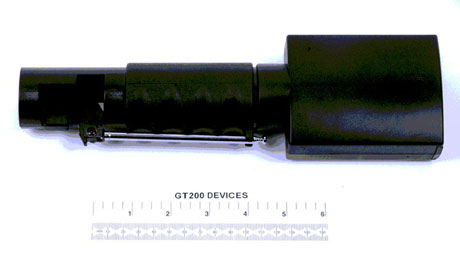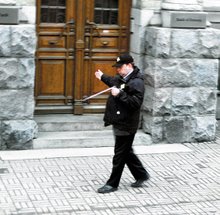UK government promoted fake bomb detectors
Three departments found to have backed Kent businessman's fraudulent scheme to sell 'useless' detection equipment

One of the devices sold by fraudster Gary Bolton. Photograph: City of London Police/PA
Three British government departments and agencies promoted the international sale of fake bomb detectors which are thought to have cost lives, despite a Whitehall-wide warning they were useless.
On Tuesday, Kent businessman Gary Bolton, 47, was jailed for seven years at the Old Bailey for fraud over the sale of thousands of devices based on novelty golf ball finders which he claimed could detect explosives and drugs but which detectives said were "nothing more than plastic handles with aerials as antennae".
In the aftermath of Bolton's sentencing, it can be revealed that the Ministry of Defence, the Foreign and Commonwealth Office and the government's trade arm, UKTI, gave promotional, diplomatic and financial backing to Bolton over several years even though a Home Office expert in bomb detection equipment found his device's ability to detect explosives was no better than random. In Thailand, where hundreds of the bogus devices were sold under the brand GT200 for use at police and army checkpoints, human rights campaigners have reported they failed to detect bombs that then killed four people. Hundreds more have been wrongly imprisoned after the fake equipment indicated they had handled explosives.
The devices were sold to security hotspots including Pakistan, India and Egypt as well as Mexico, where authorities fighting a bloody drugs war bought 1,200 of the units.
On Tuesday night, ministers were under pressure to mount an urgent investigation into Whitehall's role in the trade, which one MP labelled "a national embarrassment". The devices cost Bolton as little as £1.82 to make but were sold for as much as £15,000 each, resulting in a trade worth up to £3m a year. Thomas Docherty, a Labour member of the House of Commons defence select committee, has written to the business secretary, Vince Cable, defence secretary, Philip Hammond, and foreign secretary, William Hague, saying that "there are serious questions to be answered by a number of government departments and agencies about their role in this sorry scandal".
A Home Office scientist who ran a test in 2001 that demonstrated the so-called bomb detector was useless said he had issued a written warning against the device which was circulated to at least 1,000 officials across Whitehall, the military and police departments. It was circulated before the government launched its cross-departmental promotional drive.
Despite the stark warning, in the years after 2001, members of the Royal Engineers took Bolton's products to several exhibitions and demonstrations in 2003 and 2004, including sales drives to the Bahrain Defence Force, Kuwait, Poland, France and Venezuela.
Between 2005 and 2009, the British embassy in Mexico and its ambassador, Giles Paxman, brother of the BBC presenter Jeremy Paxman, allowed Bolton's company, Global Technical, to use the embassy and ambassador's residence for sales pitches, while UKTI provided advice on overseas markets and supported Bolton to attend foreign trade shows through a programme which awards grants to meet exhibition costs.
"Before we spend taxpayers' money promoting British-made products we need the confidence of knowing they work," said Docherty. "This sort of thing undoubtedly damages our reputation with foreign governments and they are less likely to buy British again. The government needs to establish how this happened and how we avoid it happening again."
Sentencing Bolton on two counts of making and selling an article for use in fraud over a period of five years, Mr Justice Hone said: "The culpability and harm of what you were doing is at the highest level because when used for the detection of explosives, in my judgment the use of the GT200, albeit in conjunction with other detectors, did materially increase the risk of personal injury and death."
A government spokeswoman said it "is considering evidence presented at the trial and, following sentencing, will consider what further steps might be taken to avoid future similar events".
Scrutiny of the government's role could cause cabinet tensions, as the investigation by City of London police's anti-corruption unit was funded by the Department for International Development, whose secretary of state, Justine Greening, praised Bolton's conviction.
Bolton's conviction relates to the period from 2007 to 2012, but he set up his company near Ashford in Kent in 1997. In 1999 he paid the Royal Engineers Exports Support Team (REEST) £500 to test an early version of the invention, called the Mole. The army unit found it to be accurate only about 30% of the time, the court heard, but by 2000 Bolton began demonstrating the product in Malta, Egypt, Uganda and South Africa.
He altered reports produced by REEST and another by the Dutch navy, which tested it for use against drug smugglers in the Caribbean. The doctored versions claimed the device was "very accurate" and showed uniformed army staff pointing it at rows of houses and cars to detect explosives. It said the detector "looks for the atomic structure of the substance and once located locks on giving its location", and while the document acknowledged "the general consensus of opinion was that of not believing in the Mole's capability", it concluded that "this is soon overcome when put to the test". The MoD said it could not trace a copy of the original report.
Representatives of the Royal Engineers later expressed enthusiasm for the product, two government bomb detection experts have told the Guardian. This led to tests being carried out by concerned Home Office scientists in September 2001.
"We looked at what the probability was of it detecting a live box [containing explosives] and what it was with a blank box and it was about the same, so it was not effective," said Tim Sheldon, former programme manager for testing explosives, weapons and drugs detection equipment at the Home Office's Sandridge facility in Hertfordshire.
"The customer departments [believed to be the Home Office, MoD and Department for Transport] were told that and we put a page in that year's edition of the blue book [the approved list of detection kit for government and military use] saying there has been a lot of publicity around these devices and they don't work. That went out to a circulation of around 1,000 official users."
Following the trial, the business department has admitted that "UKTI provided advice on overseas markets through the Overseas Market Introduction Service and support to attend trade shows overseas through the Tradeshow Access Programme". In Mexico, "sales meetings sometimes took place in the embassy or the residence, occasionally with the presence of the ambassador," the court heard. Paxman even wrote to the state authorities in Sonora, which borders the US, "emphasising the excellence of the UK security industry".
Bolton's sentence follows that of his former business partner, Jim McCormick, who was jailed for 10 years in May for selling around £50m worth of similar devices, many to post-war Iraq, where their use is thought to have cost lives. Speaking in mitigation, Jonathan Higgs QC, said Bolton has three children, including a eight-month-old baby, and had been diagnosed with depression, which the judge said he was sceptical about given he was a fraudster.
In his remarks, the judge said Bolton's "glib salesmanship persuaded these agencies to support the sales" and concluded: "You have damaged the reputation of British trade abroad, having duped UKTI and other agencies dedicated to supporting the export of quality British goods as opposed to the dross that you manufactured."
At the time of his arrest last year Bolton admitted "he had no background in science, research, training or specifically security" and he called in his defence an expert in dowsing, a method of "divining" for water using sticks.
A spokesman for the Foreign Office said: "The government supports thousands of British companies around the world each year in our efforts to help boost trade and investment. Global Technical received limited support from the embassy in Mexico prior to any suggestion that their activity was fraudulent."
The MoD declined to comment.


Keine Kommentare:
Kommentar veröffentlichen